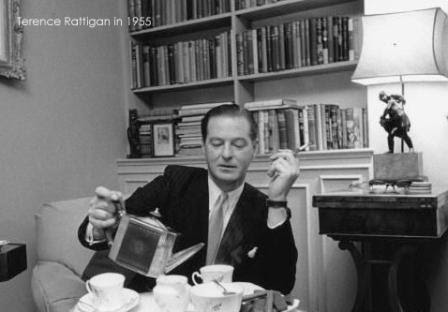October 17, 2024
By Harry Mottram: like all novelists, film makers, artists and playwrights Terence Rattigan is subject to the fashions of the day as to who is in and who is out. Jane Austen, Daphne du Maurier and Katherine Mansfield were all overlooked by critics in the past – and the playwriter Terence Rattigan fell out of favour with reviewers in the 1950s as the kitchen sink dramas and the plays of the ‘Angry Young Men’ such as John Osborne were in vogue as times changed.
However you view Rattigan’s work there is no denying the skill and underlying social themes that lie at the heart of his dramas such Table Number Seven, The Browning Version – both to be staged in Bath this month.
Nick Smurthwaite of The Stage wrote in an article in 2021: “In one of the last interviews before his death in 1977, Terence Rattigan, once Britain’s most successful playwright, made it clear that he felt betrayed by London’s theatrical establishment. He told the critic and broadcaster Sheridan Morley: ‘It’s all very well to dislike one’s plays but they ought to be disliked for a better reason than that they’re out of fashion. I always thought that justice would one day be done to me.’”
Britain in the post war 1940s and early 1950s experienced the hang-over from the war and the pre-war generation’s grip on society in decline as a new cohort looked to a loosening of social constraints which would ultimately happen in the 1960s. Rattigan’s plays were inspired by a Britain that was stifled by what was considered socially acceptable between the wars and fitted into what some might call the ‘country house plays’ of the middle classes. The so-called kitchen sink dramas like John Osborne’s Look Back in Anger, and Shelagh Delaney’s A Taste of Honey concentrated on realism and contemporary society.
Before the war Rattigan was perhaps the most successful playwright in England with hit after hit in the West End and that success continued into the late 1940s and the beginning of the 1950s with Flare Path, While the Sun Shines, The Winslow Boy, The Browning Version and The Deep Blue Sea, written in 1952. That was to change when the leading critic Kenneth Tynan denounced him as being out of kilter with modern British society.
The vagaries of fashion changed again in the 21st century when his works have been recognised as 20th century classics – yes, plays of their time – but also with telling themes that drill down into the injustices and inconsistencies of what is acceptable in society – which many feel were ahead of their time. It was an open secret that Rattigan was gay in an era when homosexuality was illegal in the UK and that is one factor in some of his writing – repressed emotions and repressed sexuality.
In Summer, 1954. Table Number Seven is set in the fading glory of a posh hotel where an army major who appears very respectable is about to be exposed for approaching young men on the sea front. In The Browning Version a teacher is about to retire from a private school when he re-examines his life which on the face of it is rather a mess – until an unexpected visit from a school boy changes things.

Theatre Royal Bath Productions and Living Theatre Productions presents
Summer 1954
Table Number Seven and The Browning Version
Written by Terence Rattigan, Directed by James Dacre
Starring Nathaniel Parker, Siân Phillips, Lolita Chakrabarti, Alexandra Dowling, Angela Jones,
Jeremy Neumark Jones, Simon Coates, Richenda Carey, Kishore Walker, Pamela Miles,
Fiona Tong, Rosalind Lailey, Bertie Hawes
Venue: Theatre Royal Bath, Sawclose, Bath, BA1 1ET
Dates: Thursday 24 th October to Saturday 2 nd November 2024
Performances: Evenings: Monday to Saturday at 7.30pm – except 30 th October at 7pm
Matinees: Sat 26 th October, Thurs 31 st October & Sat 2 nd November at 2.30pm
Tickets: £10 – £46.50 (Booking fee applies)
Box Office: 01225 448844, theatreroyal.org.uk


You must be logged in to post a comment.